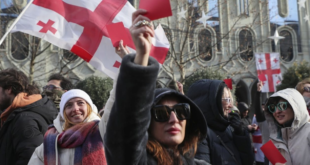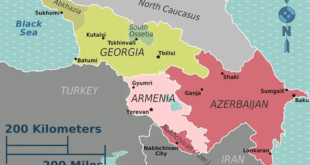 Georgia’s leader Mikheil Saakashvili has won re-election, official results showed Wednesday, sealing a bitterly fought victory that his main challenger is refusing to accept.Results based on 98.8 percent of ballots counted showed Saakashvili ahead with 52.21 percent, meaning he could not fall below the 50 percent barrier for winning in a single round, the Central Election Commission website showed.
Georgia’s leader Mikheil Saakashvili has won re-election, official results showed Wednesday, sealing a bitterly fought victory that his main challenger is refusing to accept.Results based on 98.8 percent of ballots counted showed Saakashvili ahead with 52.21 percent, meaning he could not fall below the 50 percent barrier for winning in a single round, the Central Election Commission website showed.
His nearest rival in Saturday’s snap poll was wine entrepreneur Levan Gachechiladze, with 25.26 percent.Â
With 1.2 percent of ballots left to count, the precise results for each candidate could still shift slightly, but not by enough to change Saakashvili’s victory.
Saakashvili, 40, now has a new five-year mandate to pursue radical reforms to transform US-backed Georgia’s economy and push for NATO and EU membership.
He told a late-night talk show Tuesday that the election had “demonstrated the will of the Georgian people” and he reached out to his opponents.
“No one can ignore the opinion of people who did not vote for us,” he said. “We have to find consensus with the opposition.”
However, the opposition on Tuesday refused to recognise the result, claiming Saakashvili cheated to avoid a second round and threatening a mass protest Sunday if the authorities did not agree to a run-off.
Â
The opposition’s confrontational tone raised fears of a repeat of the violent unrest in November which triggered the January 5 election.
Gachechiladze, 43, swore to fight the official results to the end, saying in an angry television appearance: “I will not stop until you kill me!”
Despite being re-elected, the fact that Saakashvili barely avoided a run-off was a powerful rebuke for someone who four years ago first took the presidency with 96 percent.
A flamboyant politician who speaks five languages, Saakashvili has won plaudits for pulling Georgia out of years of economic chaos and instability since the peaceful Rose Revolution.
However opponents accuse him of authoritarian tendencies and forgetting the poor left behind in free-market reforms.
The snap election, held a year early, got important backing from foreign observers of the Organisation for Security and Cooperation in Europe (OSCE).
However, there was also criticism in the West — a sign that Saakashvili’s image has yet to recover from the November crisis, when police clubbed demonstrators and the main opposition television station was closed.
The opposition appeared to be digging in its heels.
Tempers flared as final votes were counted, with Gachechiladze demanding the resignation of election commission head Levan Tarkhnishvili.
“You are telling lies to the whole of Georgia,” he shouted, jabbing his finger at Tarkhnishvili after barging into his office.
Justice Minister Ekaterine Tkeshelashvili attacked what she called “attempts to threaten the work of the Central Election Commission” and said the opposition must “respect the Georgian people and its choice.”
Â
There were seven candidates, including Georgia’s richest man, Badri Patarkatsishvili, whom the government accuses of plotting a coup from his London home.
Â
Georgia has a population of only five million and is largely mountainous, famous for its wine, ancient churches, and male choirs.
Â
Until recently the country was closely linked to Russia, but is now largely cut off from its former imperial and Soviet-era master.
Â
Angered by Georgia’s overtures to the West and efforts to join NATO, Moscow has imposed sweeping economic sanctions and supports armed rebels controlling two separatist regions — Abkhazia and South Ossetia.
Â
Georgia is of growing strategic importance at the crossroads of Central Asia and Europe, as well as Russia, Iran and NATO member Turkey.
Â
Major US-backed oil and gas pipelines from the Caspian Sea to the Mediterranean run through the country.
Â
Georgia also contributes 2,000 troops to the US-led war in Iraq and is about to send others to Afghanistan.
Source: Agencies
 Eurasia Press & News
Eurasia Press & News



